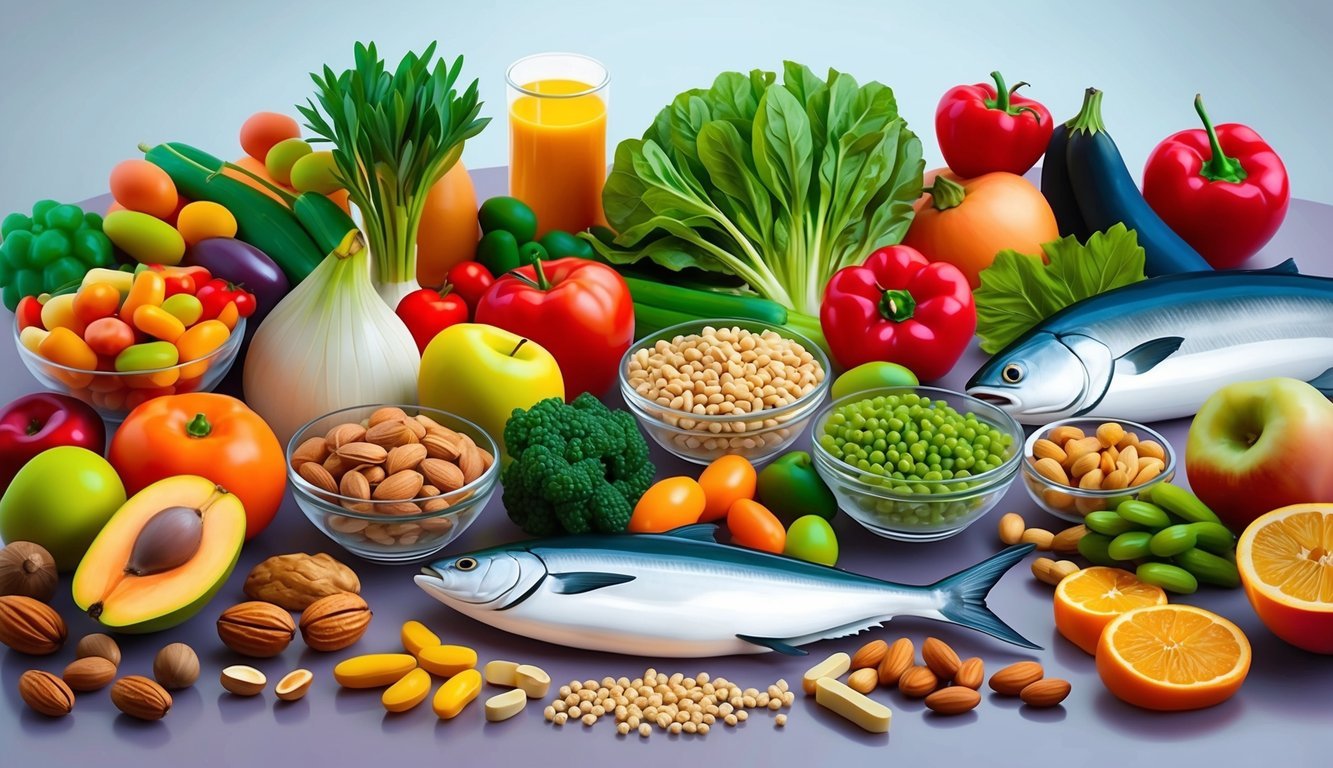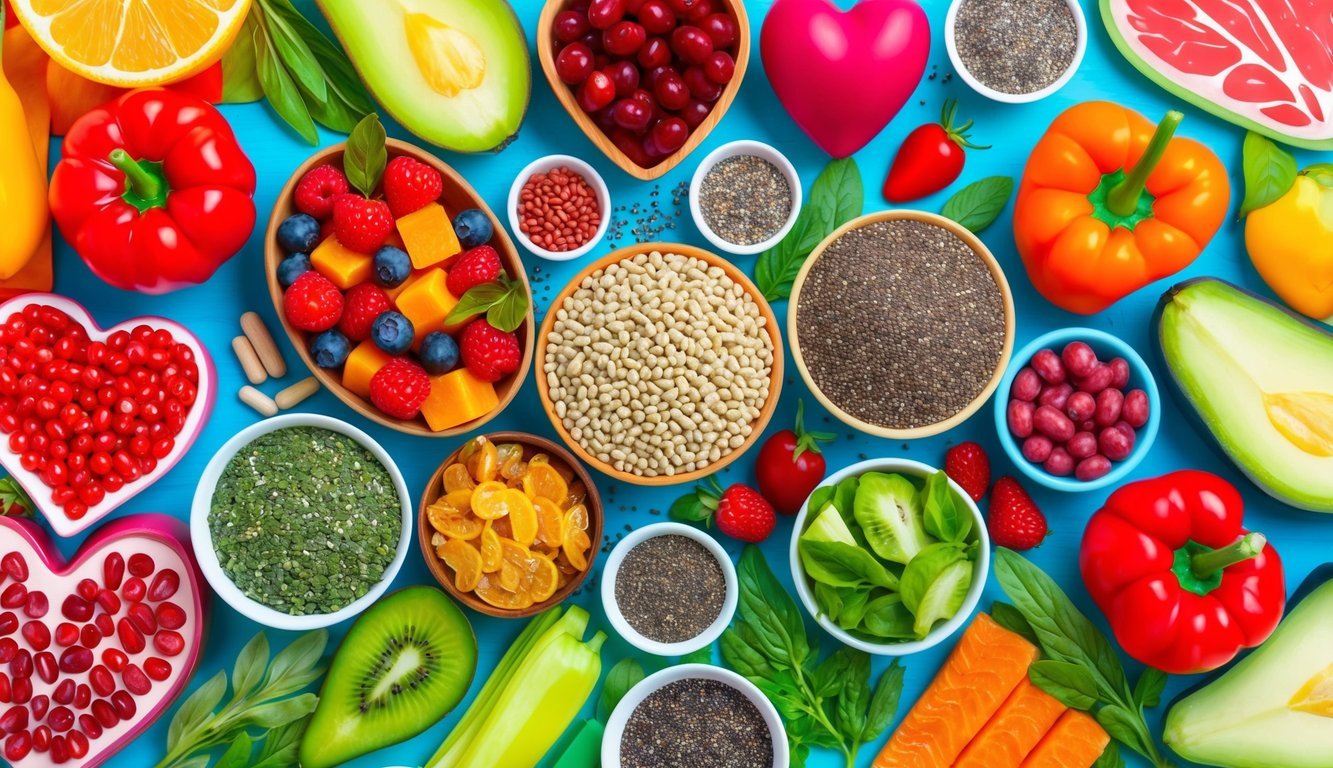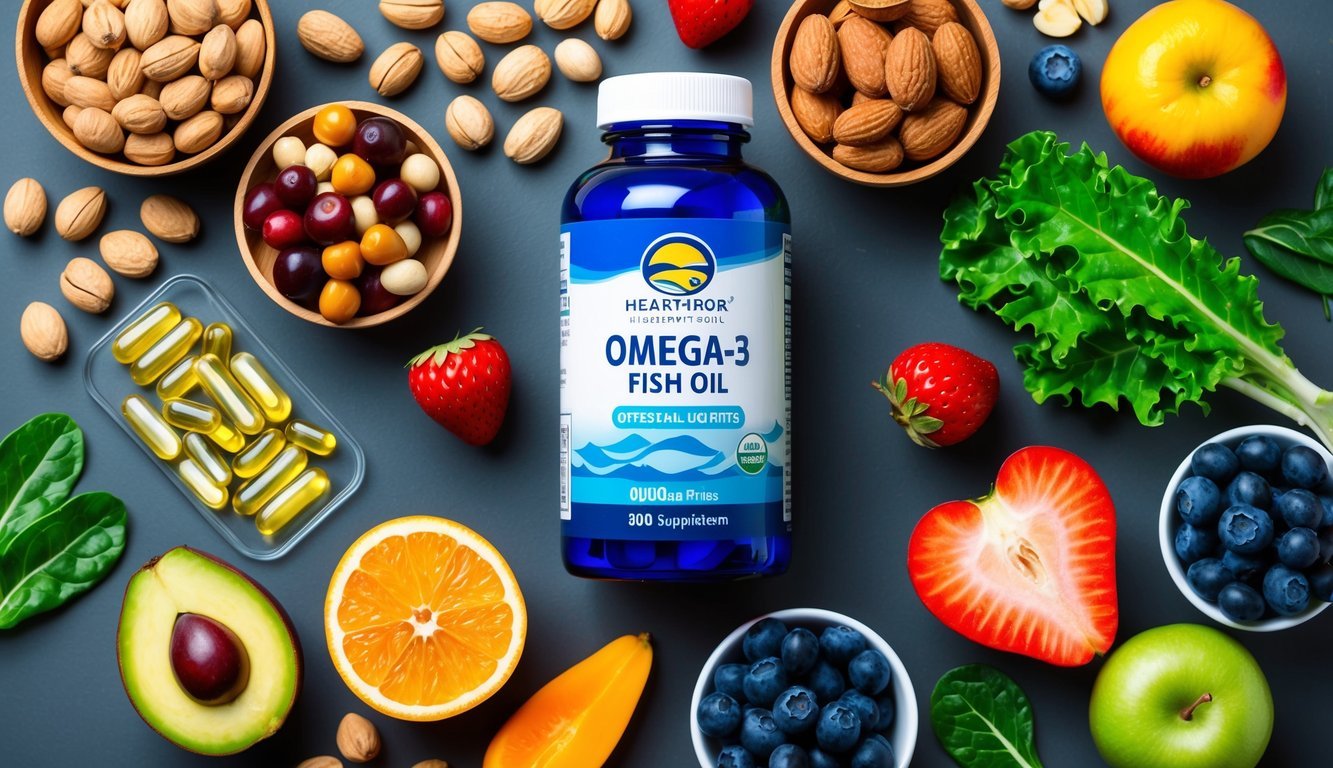When we make choices about the foods we eat and the supplements we take, we can significantly impact our overall cardiovascular health.
The right combination of nutrients can help manage blood pressure, cholesterol levels, and other risk factors associated with heart disease.

I’ve explored some of the best foods and supplements that can support heart health, making it easier for anyone to understand what they can incorporate into their diet.
By focusing on natural sources of nutrition and effective supplements, we can all take proactive steps toward better heart wellness.
1) Salmon
Salmon is one of my go-to foods for heart health.
It’s packed with omega-3 fatty acids, which are known to reduce inflammation and lower blood pressure.
Eating it regularly can help decrease the risk of heart disease.
I love that salmon is loaded with protein—about 22-25 grams in just a 3.5-ounce serving.
This makes it a great choice for maintaining muscle and overall strength.
Plus, salmon is rich in B vitamins, which play a crucial role in energy production and brain function.
It’s especially good for cognitive health, making it a smart choice for everyone, including kids.
I often include salmon in my meals at least twice a week, as recommended by health experts.
This not only keeps my heart happy but also adds a delicious flavor to my dishes.
Whether grilled, baked, or in a salad, salmon is incredibly versatile and easy to prepare.
2) Avocado
I absolutely love avocados for their versatility and health benefits.
They’re rich in monounsaturated and polyunsaturated fats, which are great for heart health.
I often toss them in salads or blend them into smoothies for some delicious creaminess.
Eating just one avocado a week can be beneficial.
Studies show that it helps lower the risk of heart disease.
The fiber content keeps me feeling full, making it easier to manage my weight.
Moreover, avocados are packed with nutrients.
Half an avocado provides significant amounts of potassium, magnesium, and folate, all essential for maintaining a healthy heart.
When I swap avocados for sources of saturated fats, I feel like I’m making a smarter choice.
They add flavor and nutrients without the downsides of processed fats.
3) Walnuts
I’ve always appreciated how walnuts fit into a heart-healthy diet.
They’re packed with good fats, specifically unsaturated fats, which can help lower my cholesterol levels.
With 18.5 grams of fat per ounce, about 90% of that is the heart-friendly kind.
What really stands out is their high content of polyunsaturated fats, which are known to support cardiovascular health.
Research has shown that regular walnut consumption can lower LDL (bad) cholesterol by 9-16%.
That’s significant when it comes to reducing the risk of heart disease.
Plus, they’re Heart-Check Certified by the American Heart Association.
That means they meet strict guidelines for being considered a heart-healthy food.
This includes being low in sodium and unhealthy fats.
Incorporating walnuts into my meals is easy.
They add a delightful crunch to salads or can be enjoyed as a standalone snack.
I often toss a handful in my oatmeal or yogurt for extra flavor and nutrition.
4) Spinach

I’ve always appreciated spinach for its versatility and health benefits.
It’s low in calories and packed with nutrients that support heart health.
This leafy green is rich in vitamins C and K, magnesium, and folate.
These nutrients can help reduce the risk of heart disease by controlling blood pressure and improving overall vascular function.
Spinach is also high in fiber, which aids digestion and helps maintain healthy cholesterol levels.
I often toss raw spinach into salads or smoothies for an extra nutrient boost.
Some research even suggests that regularly eating spinach may improve blood flow and heart function.
It’s an easy addition to my meals, whether cooked or raw, providing a delicious way to support my heart health.
5) Dark Chocolate

I love dark chocolate, and it’s more than just a tasty treat.
When I choose dark chocolate with at least 70% cocoa, I’m getting a solid dose of antioxidants.
These compounds can help support heart health.
It’s packed with important minerals too.
A typical ounce provides me with magnesium, iron, and zinc, which are great for overall health.
Plus, some studies suggest that dark chocolate can improve blood flow and lower blood pressure.
I always seek options low in heavy metals.
Brands like Mast Organic Dark Chocolate stand out because they test for lower levels of lead and cadmium.
This gives me peace of mind while enjoying my snack.
Of course, moderation is key.
A small amount can offer health benefits without adding too many extra calories.
So, I indulge in dark chocolate, knowing it’s a heart-healthy choice when enjoyed wisely.
6) Chia Seeds

I love incorporating chia seeds into my diet for their heart health benefits.
These tiny seeds are rich in omega-3 fatty acids, which can help reduce inflammation and lower cholesterol levels.
Chia seeds are also high in dietary fiber, with about 10 grams in just two tablespoons.
This fiber can support healthy digestion and promote a feeling of fullness, which may aid in weight management.
When soaked in water, chia seeds form a gel-like consistency due to their mucilage content.
This can help slow down digestion, stabilizing blood sugar levels.
This is particularly beneficial for heart health.
Adding chia seeds to smoothies, yogurt, or salads is simple and tasty.
They pack a nutritional punch and are easy to include in any meal.
7) Quinoa

Quinoa has been a staple in my kitchen for quite some time now.
It’s not just a gluten-free grain; it’s packed with protein, fiber, and essential nutrients that benefit heart health.
I love that quinoa contains all nine essential amino acids, making it a complete protein source.
This is especially great for those of us looking to support our heart while enjoying a plant-based diet.
The fiber in quinoa helps lower cholesterol levels, which is a win for heart health.
Plus, those antioxidants in quinoa can fight inflammation, another important factor in maintaining a healthy heart.
Cooking quinoa is simple, and it’s versatile enough to mix into salads, soups, or even as a side dish.
It’s widely available, making it easy for me to incorporate into my meals regularly.
If you haven’t tried quinoa yet, I highly recommend giving it a shot.
It’s a fantastic addition to any heart-healthy diet.
8) Lentils

I love incorporating lentils into my meals.
They’re not just tasty; they offer some impressive health benefits for my heart.
A half-cup of cooked lentils has about 140 calories and packs 12 grams of protein.
That’s a solid protein source without much fat.
This makes them great for a heart-healthy diet.
Lentils are high in fiber, which helps lower cholesterol levels.
I’ve found that adding them to my meals can support better digestion too.
Plus, they help manage blood sugar levels, keeping me feeling steady throughout the day.
These legumes are also rich in iron, an essential nutrient, especially in vegetarian diets.
By including lentils regularly, I’m boosting my overall nutrient intake, which feels good.
Additionally, lentils provide a good amount of protein and fiber, which help in maintaining energy levels and digestive health.
Since they are packed with important vitamins and minerals, they serve as essential supplements for a vegan diet, ensuring that key nutrients aren’t missed.
Incorporating them into my meals not only enhances flavor but also supports my overall well-being.
Cooking lentils is easy and quick.
They typically take about 10 to 40 minutes, depending on the variety.
Toss them in soups, salads, or even as a meat substitute.
9) Turmeric

I’ve always found turmeric to be an interesting addition to my diet.
This vibrant yellow spice comes from the Curcuma longa plant and has some solid health credentials.
Its active compound, curcumin, is what gives it many of its beneficial properties.
Research suggests that turmeric can help reduce inflammation in the body.
Since chronic inflammation is a risk factor for heart disease, adding turmeric to my meals seemed like a smart choice.
I often use turmeric in curries, soups, and smoothies.
It’s a versatile spice that not only adds flavor but also packs a nutritional punch.
Some studies indicate that turmeric may also support heart health by improving endothelial function, which helps maintain blood vessel health.
Plus, I’ve read that turmeric supplements can enhance mood and may help with overall well-being.
It’s definitely worth considering alongside traditional heart health strategies, especially if you enjoy cooking with spices.
Always remember, though, it’s best to talk to a healthcare professional before starting any new supplement regimen.
10) Omega-3 Fish Oil Supplements

I often hear about the benefits of omega-3 fish oil supplements for heart health.
These supplements are rich in EPA and DHA, types of omega-3 fatty acids that can support cardiovascular function.
If I’m not getting enough fish in my diet, I look for high-quality fish oil supplements.
They can help lower cholesterol levels and reduce the risk of heart disease.
It’s great to know that even those who don’t eat fish regularly can still benefit.
When choosing a fish oil supplement, I pay attention to the purity and concentration.
Some brands, like Nordic Naturals and Thorne, offer options specifically for heart health or high DHA formulations.
I also make sure to check for any added flavoring, as some supplements can have a strong fishy taste.
It’s important to talk to a healthcare provider before starting any supplement, especially if I have existing heart conditions or take other medications.
That way, I can find the best option for my needs while keeping my heart in check.
Understanding Heart Health
Taking care of my heart is crucial for overall well-being.
A healthy heart supports my body’s functions and reduces the risk of various health issues.
Learning about the importance of a healthy heart and the common problems that can arise helps me make informed decisions.
Importance of a Healthy Heart
A healthy heart pumps blood efficiently, delivering oxygen and nutrients to organs and tissues.
This is vital for my physical activity and daily functioning.
Benefits of a Strong Heart:
- Increased Energy Levels: A well-functioning heart means I have more stamina.
- Better Mood: Regular exercise and a heart-healthy diet can boost my mental health.
- Reduced Risk of Disease: Maintaining heart health can lower the chances of high blood pressure, cholesterol, and other cardiovascular issues.
When I prioritize heart health, I invest in my long-term wellness.
Eating nutritious foods, staying active, and managing stress all contribute to a stronger heart.
Common Heart Health Issues
Several common issues can affect heart health.
Being aware of these helps me stay alert and proactive.
Key Heart Health Problems:
- High Blood Pressure: Often known as a silent killer, it can lead to serious conditions if untreated.
- High Cholesterol: This can cause plaque buildup in arteries, limiting blood flow.
- Heart Disease: Conditions like coronary artery disease are major causes of heart attacks.
To combat these issues, I focus on lifestyle changes.
Eating a balanced diet rich in fruits, vegetables, and healthy fats can help.
Regular check-ups with my healthcare provider keep me informed and vigilant regarding my heart health.
Diet and Lifestyle Tips
Incorporating heart-healthy practices into my daily routine has made a significant difference.
Here are some essential tips that I focus on to support heart health through diet and exercise.
Balancing Your Meals
When I think about meals, I aim for a colorful plate.
It helps to include a variety of fruits, vegetables, whole grains, and lean proteins.
Here’s what I try to keep in mind:
- Fruits and Vegetables: Aim for at least five servings daily. Mixing colors adds different nutrients which are great for heart health.
- Whole Grains: I opt for whole grains like brown rice, quinoa, and whole-wheat bread instead of refined grains.
- Healthy Fats: Avocados, nuts, and olive oil are my go-tos. They provide essential fatty acids without the negative effects of saturated fats.
This balance not only keeps my meals satisfying but also nourishes my heart.
Role of Regular Exercise
I’ve found that keeping active is just as important as what I eat.
Regular exercise helps me maintain a healthy weight and lowers blood pressure.
Here’s my strategy:
- Moderate Activity: I aim for at least 150 minutes of moderate exercise weekly, like brisk walking or cycling.
- Strength Training: I incorporate strength training exercises twice a week. This helps build muscle and boosts metabolism.
- Making It Fun: I choose activities I enjoy, whether it’s dancing or hiking, to keep me motivated.
By staying active, I’m supporting not just my heart but my overall well-being.
Nutritional Science Behind Heart Health
In this section, I’ll dive into how specific vitamins, minerals, and omega-3 fatty acids contribute to heart health.
Understanding these factors can help me choose foods and supplements that support my cardiovascular system.
Vitamins and Minerals Role
Vitamins and minerals play a crucial part in maintaining heart health. Potassium, for example, helps regulate blood pressure by balancing sodium levels.
Good sources include bananas, sweet potatoes, and spinach.
Magnesium supports overall heart function by contributing to normal rhythm and blood vessel health.
It can be found in nuts, seeds, whole grains, and leafy greens.
Folate is another important nutrient, helping to reduce homocysteine levels, which are linked to heart disease.
Foods rich in folate include lentils, chickpeas, and asparagus.
My supplement choices can include multivitamins that provide these essential nutrients, ensuring I’m covered in case my diet is lacking.
Impact of Omega-3 Fatty Acids
Omega-3 fatty acids are well-known for their heart-protective properties.
They help lower triglyceride levels and reduce inflammation, which is a contributing factor to heart disease.
You can incorporate these healthy fats through foods like salmon, mackerel, and walnuts.
For those who struggle to get enough through diet, fish oil supplements can be a great option, offering a concentrated source of omega-3s.
Research suggests that regular consumption of omega-3s can improve overall heart health and may even reduce the risk of arrhythmias.
Keeping these in mind while selecting my meals can greatly enhance my heart health.

